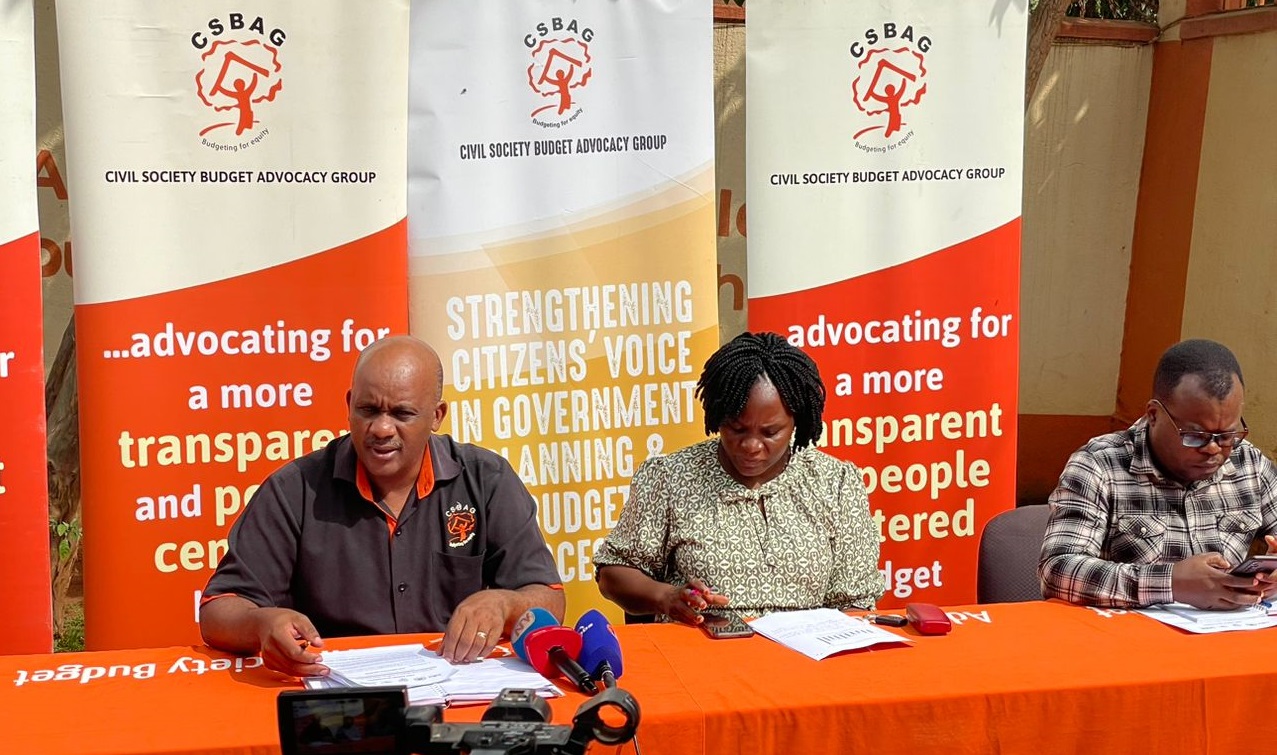KAMPALA, (UG): Civil Society Organizations (CSOs) under their umbrella body, the Civil Society Budget Advocacy Group (CSBAG) have warned that more potential donors are likely to follow World Bank’s decision to withdraw their aid to Uganda which might leave the country crippled economically.
The CSOs say the suspension of financial aid by World Bank is likely to see increased poverty inequality, a reduction in financing the social sector, pressure on commercial loans but also losses in jobs, and a reduction of tax collection.
While addressing journalists today at their offices in Kampala, Mr Julius Mukunda, the Executive Director of CSBAG urged the government to reconsider a budget review and cut unnecessary expenditures now that international money lender which funded 18% of the country’s budget has withdrawn their aid.
Mr Mukunda highlighted that the World Bank’s decision to halt funding for public projects in Uganda could greatly hinder the country’s progress towards its Vision 2040 and the achievement of the Sustainable Development Goals (SDGs).
According to him, the World Bank has over the years offered financing support to Uganda’s development agenda, with over 30 active projects to date and 13 projects in the pipeline totalling Ugx 51trillion (USD 13.9bn), all of which face a dilemma should the decision by the international lender stand.
He said; “freezing of funding by the World Bank may lead to a substantial withdrawal of dollars from the Ugandan market which as of June 2023, the Bank of Uganda held gross forex exchange reserves of $4,074.6 million USD.”
Underlining the effects resulting from the withdrawn international funding, he therefore called on Government to among other suggestions reduce public administration costs which will help allocate the country’s revenue to critical sectors.
“We reiterate our call for Government to re-examine its spending patterns with the main objective of further cutting down public administration costs through; reviewing the public salary structures, rationalising government ministries and agencies, reducing local government administration units and staff on contracts,” Mr Mukunda said.
The Acting Executive Director of the Initiative for Social and Economic Rights (ISER), Ms Angella Kasule Nabwowe warned that halted funding could severely disrupt the education sector, particularly projects funded by traditional schools and therefore advocated for an immediate action from government to prevent a crisis in the education sector.
“We know that Uganda is one of the countries that were affected by COVID in terms education sector. The likelihood of halt of the specific loan of $300m aimed at increasing traditional schools is going to affect public schools,” Ms Nabwowe said.
On the other hand, Mr Jonas Mbabazi Musinga, a Research Fellow at ACODE (Advocates Coalition for Development and Environment ) expressed concern that the funding suspension could worsen the poverty level in the country, particularly among women, children, and young people who comprise the majority of Uganda’s population.
“The likelihood of an increase in domestic borrowing by Gov’t is going to affect access to financing by the private sector; we will not create more jobs and fewer taxes will be created,” Mr Musinga said.
He, therefore, suggested that the government should curtail expenses related to conferences, workshops, and large fleets of cars used by ministers and other public servants.
A representative of Uganda Debt Network (UDN), Mr Gilbert Musinguzi advised the government to consider rationalizing various state agencies by merging them with their parent ministries to save significant funds, which could then be redirected to other priority sectors.
He also called for a stringent stance against corruption within public entities, to help Ugandans realize Vision 2040 and advised for a dialogue between the World Bank and the Government to have the freezing of funds halted.
“We are hopeful that dialogue between the Government of Uganda and the World Bank could lead to a reconsideration of the funding suspension,” Musinguzi said, before urging the international money lender to reconsider its position given the multiplier effects it is going to have to have on the Ugandan population, especially the poor.
The CSOs’ call comes after Finance state minister Hon Henry Musaszi on Friday said the government is engaging the World Bank on its decision to cut financing of projects in Uganda.
“We are negotiating with the World Bank but should we fail to agree, then we shall make some decisions on the budget which we shall bring to the attention of Parliament for approval,” Minister Musasizi said on Friday.
The Minister acknowledged that the move by the World Bank will have dire consequences on the operations of the government. “We are still gathering ideas about what to do in line with adjusting the budget but this will require your approval,” he said.
If you would like your article/opinion to be published on Uganda’s most authoritative news platform, send your submission on: [email protected]. You can also follow DailyExpress on WhatsApp and on Twitter (X) for realtime updates.



